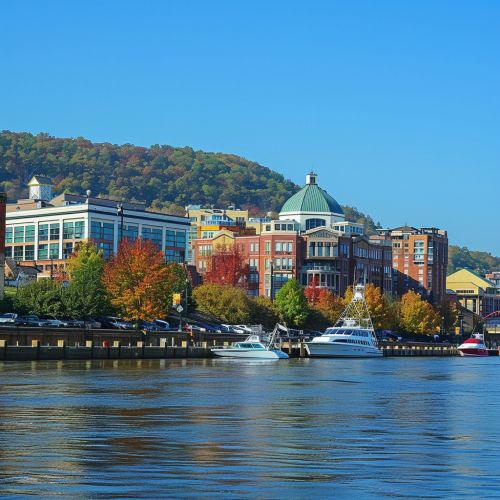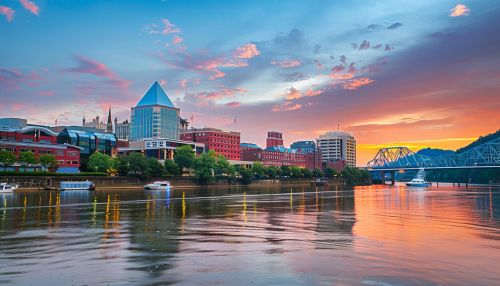Chattanooga
History
Chattanooga, a city located in southeastern Tennessee, has a rich and diverse history that dates back thousands of years. The area was originally inhabited by Native American tribes, including the Cherokee, who called the region "Chatanuga," meaning "rock rising to a point." The city's strategic location along the Tennessee River made it a significant site for trade and settlement.
During the early 19th century, European settlers began to move into the area, leading to the establishment of the city in 1839. Chattanooga played a crucial role during the American Civil War, serving as a major transportation hub due to its railroads and river access. The Battle of Chattanooga in 1863 was a pivotal moment in the war, leading to Union control of the city and opening the gateway to the Deep South.


Geography
Chattanooga is situated in the southeastern part of Tennessee, nestled between the Appalachian Mountains and the Cumberland Plateau. The city is characterized by its diverse topography, including mountains, valleys, and the Tennessee River, which flows through the heart of the city. The river has historically been a vital resource for transportation, commerce, and recreation.
The city's climate is classified as humid subtropical, with hot, humid summers and mild winters. This climate supports a variety of flora and fauna, contributing to the region's rich biodiversity.
Economy
Chattanooga's economy has evolved significantly over the years. In the early 20th century, the city was known for its manufacturing and industrial sectors, particularly in iron and steel production. The presence of the Tennessee River facilitated the growth of these industries by providing a means for transporting raw materials and finished goods.
In recent decades, Chattanooga has diversified its economy, becoming a hub for technology and innovation. The city is home to the Chattanooga Metropolitan Airport, which supports both passenger and cargo flights, further enhancing its economic connectivity. Additionally, the establishment of the Gig City initiative, which provides high-speed internet access, has attracted numerous tech companies and startups to the area.
Education
Chattanooga is served by several institutions of higher education, including the University of Tennessee at Chattanooga (UTC), which offers a wide range of undergraduate and graduate programs. UTC is known for its research initiatives and contributions to various fields, including engineering, business, and health sciences.
The city also has a robust public school system, managed by the Hamilton County Department of Education. Numerous private and charter schools provide additional educational options for residents.
Culture and Recreation
Chattanooga boasts a vibrant cultural scene, with numerous museums, theaters, and galleries. The Hunter Museum of American Art houses an extensive collection of American art, while the Tivoli Theatre hosts a variety of performances, including concerts, plays, and ballets.
Outdoor recreation is a significant aspect of life in Chattanooga, thanks to its natural surroundings. The city offers numerous parks, trails, and recreational areas, including the Chickamauga and Chattanooga National Military Park, which preserves the sites of key Civil War battles. The Tennessee Aquarium is another popular attraction, featuring a wide array of aquatic life and educational exhibits.
Transportation
Chattanooga's transportation infrastructure includes a network of highways, railroads, and public transit systems. The city is served by Interstate 24, Interstate 75, and Interstate 59, which connect it to major cities in the region. The Chattanooga Area Regional Transportation Authority (CARTA) operates a comprehensive public transit system, including buses and a free electric shuttle service in the downtown area.
The city's railroads continue to play a vital role in freight transportation, with several major rail lines passing through Chattanooga. The Tennessee River also remains an important transportation route, supporting commercial shipping and recreational boating.
Demographics
As of the latest census, Chattanooga has a diverse population, with a mix of ethnicities and cultural backgrounds. The city's population has been steadily growing, driven by its economic opportunities and quality of life. Chattanooga's demographic profile includes a significant number of young professionals, families, and retirees, contributing to a dynamic and multifaceted community.
Government and Politics
Chattanooga operates under a mayor-council form of government, with the mayor serving as the chief executive officer and the city council acting as the legislative body. The city is divided into several districts, each represented by a council member. The local government is responsible for providing essential services, including public safety, infrastructure maintenance, and community development.
Chattanooga is also part of Hamilton County, which provides additional governmental services and support. The city's political landscape is characterized by active civic engagement and a commitment to addressing local issues through collaborative efforts.
See Also
- Tennessee River
- Appalachian Mountains
- University of Tennessee at Chattanooga
- Hunter Museum of American Art
- Chickamauga and Chattanooga National Military Park
